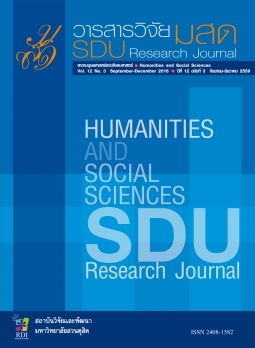การติดตามและประเมินผลการศึกษาตามแผนการศึกษาแห่งชาติ ฉบับปรับปรุง (พ.ศ. 2552 – 2559)
Keywords:
Revised National Education Plan (2552-2559 B.E.), Effectiveness, Efficiency, SustainabilityAbstract
The research on monitoring and evaluating education based on the Revised
National Education Plan (2552-2559 B.E.) aimed to monitor and evaluate results of
the work operation under the objectives, policies, targets and frameworks defined in
the National Education Plan of educational agencies in 5 aspects: linkages, effectiveness,
efficiency, affection and sustainability. The three main assessments included:
1) documents analysis, 2) focus group, and 3) interview. The results revealed that:
1) the plans/projects under educational agencies were found to be in accordance with the
objectives and policies in the National Education Plan. 2) The educational agency
efficiency was comprised of the plans for action, most of which were ineffective.
3) The effectiveness of the plans for action, for instance the development of educational
quality and learning as well as educational classification, demonstrated that quantitatively
there were more graduates and people with access to education; however, some areas of
study exceeded the current demand. Qualitatively, there were problems with knowledge,
work operation skill, and language skill of the graduates. 4) Thai people were dissatisfied
with the operation plans. 5) The Revised National Education Plan (2552-2559 B.E.) was a
continuation from the previous National Education Plan 2545-2551 B.E.; the plans under
the agencies emphasized governance by policies and ministers from the government.
References
จาก http://www.moe.go.th/moe/th/news/detail.php?NewsID=23714&Key=
hotnews.
กมลมาลย์ ไชยศิริธัญญา และนพดล เจนอักษร. (2558). การบริหารการศึกษาแบบรัฐร่วมเอกชน. Veridian
E-Journal, Silpakorn University. 8(1), 95-108.
เอื้อมพร หลินเจริญ สิริศักดิ์ อาจวิชัย และภีรภา จันทร์อินทร์. (2552). ปัจจัยเชิงสาเหตุที่ทำให้คะแนน
การทดสอบ O-NET ของนักเรียนชั้นประถมศึกษาปีที่ 6 และชั้นมัธยมศึกษาปีที่ 6 ต่ำ.
กรุงเทพฯ : สถาบันการทดสอบทางการศึกษาแห่งชาติ.
Chianca, T. (2008). The OECD/DAC Criteria for International Development Evaluation:
An Assessment and Ideas for Improvement. Journal of Multi Disciplinary
Evaluation, 5(9) 41-51.
Lawrence, G, H,. (2005). Making Strategy Work : Leading Effective Execution and Change.
Pearson Education, Inc.: Wharton School Publishing.
Translated Thai References
Chaisirithanya, K. & Chenaksara, N. (2015). Public-Private Partnerships in Educational
Administration. Veridian E-Journal, Silpakorn University. 8(1), 95-108. (in Thai)
Linjarearn, A., Ardwichai, S., Janin, P. (2009). The causal factors that cause O-NET test
scores of students in the grade sixth and grade twelve low. Bangkok: National
Institute of Education Testing Service. (in Thai)
Ministry of Education. (2011). Any problems that make quality education Thailand
downturn. Retrieved 30 November 2016, from http://www.moe.go.th/moe/th/
news/detail.php?NewsID=23714&Key=hotnews. (in Thai)







